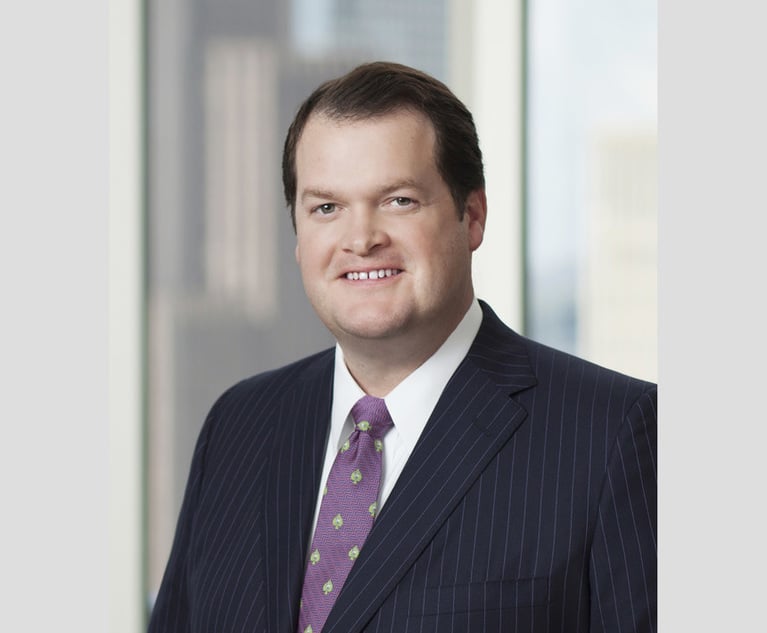Longford Capital Strikes $67M Litigation Finance Deal
In the latest example of potential portfolio appeal, the litigation financier is investing $67 million in a "leading litigation firm."
August 27, 2018 at 05:27 PM
4 minute read

Litigation funders have long said that law firms are interested in packaging multiple cases into one funding deal known as a “portfolio.”
Providing more evidence for that argument, Longford Capital Management announced Monday that it had struck a $67 million portfolio deal with an unnamed “leading litigation firm.” The Chicago-based litigation funder also said it had previously struck a $50 million portfolio deal and it has now spent more than two-thirds of a $500 million fund it raised one year ago.
The $67 million is already slated to be spent on attorney fees and other costs related to roughly 15 cases that Longford has already agreed to fund, said managing director and general counsel William Farrell Jr. The cases are on behalf of various clients; range in amount in dispute from $25 million to more than $100 million; and are being litigated by multiple lawyers at the firm, said Farrell, a co-founder of Longford. He declined to name the firm, citing privacy concerns for its clients.
 William Farrell Jr..
William Farrell Jr..“One of the objectives of this particular firm and many others is they want to be able to make this process easy,” Farrell said. “They don't want to go through an RFP process. They don't want to have due diligence done by two or three or five different funders because it's distracting.”
So-called portfolio deals are beneficial for litigation funders because they spread out the risk of losing capital among a number of cases. In turn, portfolio deals are a cheaper financing option for law firms and corporate litigants than one-off cases. Funders also said portfolio deals can be a way for law firms to use financing in more creative ways than simply lowering their risk in contingency cases.
Portfolio deals can be structured in a number of ways. Some deals, like Longford's, are documented from the outset with a prearranged number of cases and potential returns. Others are more open-ended and can represent an agreement to fund cases up to a particular dollar amount in the future.
“We look at each and every case,” said Farrell, a former partner at Chicago-based Neal, Gerber & Eisenberg. “We underwrite each case as if it were a single investment. It's a little more time consuming, but we really think we bring value to law firms in the process beyond the capital.”
Still, there are only a handful of known portfolio deals. Burford Capital Ltd., which recently announced its half-year financial results, has said it invested $100 million in a global firm's commercial litigation cases; $50 million in another large firm's arbitration cases; and $45 million to fund cases for a company that press reports later identified as British Telecom. In May 2017 year, a new litigation boutique, now called Pierce Bainbridge Beck Price & Hecht, reported that it had received funding from Pravati Capital LLC for a number of its cases.
Burford's recent financial numbers showed that the London-based company invested $205 million in the first half of the year in portfolio deals. That represented 70 percent growth from the same period a year ago. Burford, which has continued to hire former Big Law litigators, invested $88 million in more traditional “one-off” litigation during that time.
For Longford, the $67 million deal is the biggest in the company's history. It is also larger than the first fund Longford raised for litigation finance, which was $56.5 million in 2014.
This content has been archived. It is available through our partners, LexisNexis® and Bloomberg Law.
To view this content, please continue to their sites.
Not a Lexis Subscriber?
Subscribe Now
Not a Bloomberg Law Subscriber?
Subscribe Now
NOT FOR REPRINT
© 2025 ALM Global, LLC, All Rights Reserved. Request academic re-use from www.copyright.com. All other uses, submit a request to [email protected]. For more information visit Asset & Logo Licensing.
You Might Like
View All
Paul Hastings, Recruiting From Davis Polk, Adds Capital Markets Attorney
3 minute read
Goodwin Procter Relocates to Renewable-Powered Office in San Francisco’s Financial District


Greenberg Traurig Combines Digital Infrastructure and Real Estate Groups, Anticipating Uptick in Demand
4 minute readTrending Stories
- 15th Circuit Considers Challenge to Louisiana's Ten Commandments Law
- 2Crocs Accused of Padding Revenue With Channel-Stuffing HEYDUDE Shoes
- 3E-discovery Practitioners Are Racing to Adapt to Social Media’s Evolving Landscape
- 4The Law Firm Disrupted: For Office Policies, Big Law Has Its Ear to the Market, Not to Trump
- 5FTC Finalizes Child Online Privacy Rule Updates, But Ferguson Eyes Further Changes
Who Got The Work
J. Brugh Lower of Gibbons has entered an appearance for industrial equipment supplier Devco Corporation in a pending trademark infringement lawsuit. The suit, accusing the defendant of selling knock-off Graco products, was filed Dec. 18 in New Jersey District Court by Rivkin Radler on behalf of Graco Inc. and Graco Minnesota. The case, assigned to U.S. District Judge Zahid N. Quraishi, is 3:24-cv-11294, Graco Inc. et al v. Devco Corporation.
Who Got The Work
Rebecca Maller-Stein and Kent A. Yalowitz of Arnold & Porter Kaye Scholer have entered their appearances for Hanaco Venture Capital and its executives, Lior Prosor and David Frankel, in a pending securities lawsuit. The action, filed on Dec. 24 in New York Southern District Court by Zell, Aron & Co. on behalf of Goldeneye Advisors, accuses the defendants of negligently and fraudulently managing the plaintiff's $1 million investment. The case, assigned to U.S. District Judge Vernon S. Broderick, is 1:24-cv-09918, Goldeneye Advisors, LLC v. Hanaco Venture Capital, Ltd. et al.
Who Got The Work
Attorneys from A&O Shearman has stepped in as defense counsel for Toronto-Dominion Bank and other defendants in a pending securities class action. The suit, filed Dec. 11 in New York Southern District Court by Bleichmar Fonti & Auld, accuses the defendants of concealing the bank's 'pervasive' deficiencies in regards to its compliance with the Bank Secrecy Act and the quality of its anti-money laundering controls. The case, assigned to U.S. District Judge Arun Subramanian, is 1:24-cv-09445, Gonzalez v. The Toronto-Dominion Bank et al.
Who Got The Work
Crown Castle International, a Pennsylvania company providing shared communications infrastructure, has turned to Luke D. Wolf of Gordon Rees Scully Mansukhani to fend off a pending breach-of-contract lawsuit. The court action, filed Nov. 25 in Michigan Eastern District Court by Hooper Hathaway PC on behalf of The Town Residences LLC, accuses Crown Castle of failing to transfer approximately $30,000 in utility payments from T-Mobile in breach of a roof-top lease and assignment agreement. The case, assigned to U.S. District Judge Susan K. Declercq, is 2:24-cv-13131, The Town Residences LLC v. T-Mobile US, Inc. et al.
Who Got The Work
Wilfred P. Coronato and Daniel M. Schwartz of McCarter & English have stepped in as defense counsel to Electrolux Home Products Inc. in a pending product liability lawsuit. The court action, filed Nov. 26 in New York Eastern District Court by Poulos Lopiccolo PC and Nagel Rice LLP on behalf of David Stern, alleges that the defendant's refrigerators’ drawers and shelving repeatedly break and fall apart within months after purchase. The case, assigned to U.S. District Judge Joan M. Azrack, is 2:24-cv-08204, Stern v. Electrolux Home Products, Inc.
Featured Firms
Law Offices of Gary Martin Hays & Associates, P.C.
(470) 294-1674
Law Offices of Mark E. Salomone
(857) 444-6468
Smith & Hassler
(713) 739-1250










